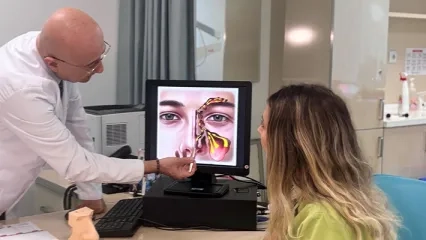In vitro fertilization (IVF) treatment is an assisted reproductive technology used to help couples who cannot have children naturally. There are many factors that can prevent couples from having children naturally. Among these, there may be reasons related to the woman and the man, as well as couples who have normal evaluations but still cannot have children, which is defined as infertility of unknown cause.
In vitro fertilization treatment can be applied to women whose tubes are blocked or removed, older women with decreased egg number and quality, those with problems such as endometriosis or polycystic ovaries, and in the presence of a genetic disease. IVF treatment can also be applied in cases of male infertility or unexplained infertility (infertility).
Alo Yeditepe
Alo Yeditepe
In-Vitro Fertilization (IVF)
What is IVF? IVF Treatment
IVF Center
Yeditepe University Hospitals, in accordance with its mission and vision, provides health services in all branches without any profit motive. The IVF Center, which continues to work in this orbit, continues its activities in order to produce the right solutions for couples who want to have a baby. All treatment strategies prepared with a personalized and couple-specific IVF treatment approach are planned in the light of scientific data and current approaches.
Yeditepe University Hospitals IVF Center's strong physician staff and a large team of experienced embryologists and biologists stand out with its different approach, especially for difficult cases. The treatment and management of all patients are carried out with the joint decision of this team.
In the embryology laboratory, which plays an extremely important role in the treatment of infertility, advanced technology is used and current approaches are followed and implemented.
In vitro fertilization (IVF) is the name given to a series of procedures performed for couples who have difficulty in having children. There are some stages of in vitro fertilization (IVF) treatment.
Development of more than one egg with external medication. Egg development is monitored by ultrasound examinations at intervals of a few days.
When the egg follicles reach a sufficient size, the eggs are collected under vaginal ultrasound guidance. This procedure is usually performed under anesthesia.
Combining the collected eggs with sperm in the laboratory to obtain embryos.
Monitoring the development of the embryo and transferring it into the uterus when it reaches sufficient maturity. The transfer process is painless and does not require anesthesia.
Yeditepe University Hospitals IVF Center, which brings together expertise and compassion for couples who dream of having a baby, serves with its experienced physician staff and advanced technology infrastructure. In our center, personalized treatment plans carefully prepared for each couple are applied. One of the most important factors that differentiate our center is that we have a large team of nationally and internationally recognized specialist physicians and embryologists. We make a difference with our multidisciplinary approach, especially in challenging cases, and we evaluate the treatment process of each patient as a team. High success rates are achieved thanks to the treatment protocols we shape in the light of current scientific data.
Our modern embryology laboratories are equipped with the most advanced technological equipment and are subject to strict quality control processes. Specialized treatment approaches are developed especially for patients with advanced age, low ovarian reserve, endometriosis or recurrent IVF failure. Within the framework of our patient-oriented service approach, we stand by our couples at every stage of the treatment process and all their questions and concerns are meticulously answered.
What are the Success Rates of IVF Centers?
While informing couples, the success rate of IVF treatment can be given specifically according to patient groups and sometimes according to the age of the patient. The basic success rate is the annual and average success rate given regardless of the groups. This rate reflects the pregnancy rate per embryo transfer and is generally around 50 percent today. Pregnancy rates vary significantly depending on the age of the patient, the underlying cause and the presence of a male factor. Couples are informed about pregnancy rates per embryo transfer. Our success rate is in line with the standards of all the world-renowned centers that work meticulously and seriously.
What distinguishes an IVF Center from other centers?
Yeditepe University Hospitals, in accordance with its mission and vision, provides health services in all branches without any profit motive. The IVF Center, which continues to work in this orbit, continues its activities in order to produce the right solutions for couples who want to have a baby.
- All treatment strategies prepared with a personalized treatment approach are planned in the light of scientific data and current approaches.
- In the center, where honest and moral values are always kept at the forefront, services are provided with physicians and embryologists who have made a name for themselves not only in our country but also worldwide.
- The strong physician staff and a large team of experienced embryologists and biologists at Yeditepe University Hospitals IVF Center draws attention with its different approach especially for difficult cases. The treatment and management of all patients are carried out with the joint decision of this team.
- In the embryology laboratory, which plays an extremely important role in the treatment of infertility, we try to follow and apply current approaches in this field as well as the use of advanced technology.
- In laboratories where there is no room for error in applications, quality and functioning are subject to continuous audits.
- In the center, where a patient-oriented approach is maintained with the awareness that IVF applications are a treatment that requires seriousness, it is determined as a basic principle that all causes of infertility are meticulously investigated and treatment is started after the underlying problem is fully determined. In this way, patients are protected from unnecessary and excessive treatments while not wasting time.
- At Yeditepe University Hospitals IVF Center, special treatment protocols are applied for patients with advanced age and low ovarian reserve. Patients who are closely related to infertility such as Polycystic Ovary Syndrome (PCOS), endometriosis and difficult cases such as recurrent IVF failures are followed up with many years of experience.
- In the center, which is always with the patients in all processes of infertility treatment and tries to find answers to all kinds of questions in the fastest way possible, the center also pays utmost attention to patient rights and confidentiality of personal data.
What is Drug-free IVF?
Natural IVF, also called natural IVF, differs from conventional IVF in that no medication is used to trigger egg development.
Normally, women develop one egg in each menstrual cycle. In patients undergoing IVF, medication is given for 8-12 days to ensure the development of more than one egg. In the natural IVF method, no medication is given, the patient's natural menstrual cycle is followed. With this method, one egg develops, but since the developing egg is selected and developed by the body, it is more likely to be of good quality. Egg retrieval takes a short time and can be performed without anesthesia according to the patient's preference. The rest of the procedure is the same as conventional IVF, the collected egg is fertilized with sperm in the laboratory and when the embryo development is complete, it is transferred into the uterus. However, since only one egg is collected, the chance of pregnancy is lower than with conventional IVF.
There are some situations where natural IVF may be preferable. One of these is in patients who have tried medicated IVF before but have had very few or no eggs. When natural egg development is detected in these patients, its development is monitored by ultrasound and when it reaches a sufficient size, it is collected. It is also preferred by patients who do not want to use drugs and hormones. This approach, which is the closest IVF method to natural reproduction, is successfully applied in our center.
Who can Undergo in Vitro Fertilization (IVF)?
IVF (in vitro fertilization) treatment is an assisted reproductive technology applied to help couples who cannot have children naturally. There are many factors that can prevent couples from having children naturally. Among these, there may be reasons related to the woman and the man, as well as couples who have normal evaluations but still cannot have children, which is defined as infertility of unknown cause.
In vitro fertilization (IVF) treatment can be used for couples who cannot conceive a child naturally for various reasons. IVF treatment is recommended in the following cases:
- Blocked or removed fallopian tubes: If the fallopian tubes are surgically removed or blocked, in vitro fertilization is the most effective method, as it is not possible for sperm and egg to unite naturally.
- Advanced Age and Decreased Egg Reserve: As a woman's age increases, egg reserve and quality decrease. Especially in women aged 35 and over, IVF treatment can be used to increase the chance of pregnancy.
- Male Infertility Factors: In cases such as sperm count, motility or deformities (morphology); even in cases where there is no sperm in the semen (azoospermia), IVF can be applied with the microinjection (ICSI) method.
- Unexplained Infertility: “Unexplained infertility” is diagnosed in couples in whom all tests are normal but pregnancy cannot be achieved despite regular, unprotected intercourse for one year. In this case, IVF treatment can give successful results.
- Endometriosis: This disease, which is characterized by the presence of endometrial tissue outside the uterus, can prevent pregnancy by disrupting the function of the tubes. It is known that approximately 30% of women with endometriosis develop infertility.
- Ovulation Disorders: Conditions such as Polycystic Ovary Syndrome (PCOS) can prevent ovulation and make pregnancy difficult. In such disorders, IVF treatment may be recommended along with ovulation regulation.
- Genetic Disease Carriage: If there is a risk of a hereditary disease in the expectant mother or father, Preimplantation Genetic Diagnosis (PGD) can be performed on embryos to select healthy embryos.
- Fertility Preservation Before Cancer Treatment: Egg or embryo freezing can be performed before cancer treatment (chemotherapy/radiotherapy). After the health condition improves, pregnancy can be achieved through in vitro fertilization.
IVF treatment should be planned with a personalized approach and the underlying causes should be analyzed correctly.
In which cases is in vitro fertilization (IVF) preferred?
In vitro fertilization (IVF) treatment is generally preferred in the following cases:
Women with blocked or removed tubes; If the Fallopian tubes or oviduct are blocked or the tubes are surgically removed, IVF treatment can be applied because fertilization is not possible.
Women of advanced age; As the woman's age progresses, egg reserve and quality decrease. Since the chance of pregnancy decreases especially in women over the age of 35, IVF treatment can increase the chance of success in order to achieve pregnancy.
Male-related infertility factor; In cases where a woman cannot have children, male-related infertility causes are as important as the female factor. If the sperm count, mobility or morphology is low in men; even in cases where there is no sperm in semen (azoospermia), IVF treatment can be applied by microinjection (ICSI) method.
Unexplained infertility (infertility): The condition defined as unexplained infertility (infertility) is defined as the absence of an underlying problem or abnormality after all evaluations in couples who cannot achieve pregnancy despite one year of regular unprotected sexual intercourse. IVF treatment can also be applied in couples with infertility of unknown cause.
Endometriosis: Endometriosis, a very common problem among women, affects the lives of one in every 10 women. This disease, which occurs when endometrial tissues are located outside the uterus, can disrupt the function of the tubes and make it difficult to conceive naturally. It is known that 30 percent of endometriosis patients suffer from infertility.
Ovulation disorders: In order for women to conceive, ovulation must occur. When conditions such as polycystic ovary syndrome (PCOS) prevent ovulation, infertility can occur. For this reason, PCOS is one of the most common causes of infertility in women. IVF treatment can also be performed in cases of ovulation disorders in women.
Presence of genetic disease: If one of the couples is a carrier of a hereditary disease, IVF treatment can be applied by selecting healthy embryos with preimplantation genetic diagnosis (PGD).
Before cancer treatment: Eggs or embryos can be frozen before chemotherapyor radiotherapy to treat cancer. In this way, pregnancy can be achieved by IVF method after the woman regains her health.
What is the IVF treatment process like?
IVF treatment is a planned process consisting of various stages and each stage is meticulously monitored by a team of experts. The process usually includes the following steps;
• Initial Evaluation and Tests
A detailed medical history of the couple is taken and some tests are ordered for both the woman and the man. Ultrasonography, hormone levels, sperm analysis and, if necessary, hysteroscopy are performed.
• Stimulation of the Ovaries (Ovarian Stimulation)
Hormone-containing drugs are given to the woman's ovaries to produce more than one egg. This phase usually lasts 8-14 days and egg development is monitored with regular ultrasoundcontrols.
• Egg Collection Oocyte Pick-up (OPU)
Egg cells are collected in a mildly anesthetized procedure performed under vaginal ultrasound. On the same day, the man's sperm sample is taken and prepared in the laboratory.
• Fertilization and Embryo Development
Eggs and sperm are brought together in the laboratory. If necessary, microinjection (ICSI) is used. The fertilized eggs develop into embryos and are monitored in the laboratory for 3 to 5 days.
• Embryo Transfer
One of the best quality embryos (or more if necessary) is transferred into the
uterus using a thin catheter. The procedure is painless and usually does not
require anesthesia.
• Pregnancy Test
Approximately 10-12 days after the embryo transfer, a beta-hCG blood test
is performed to check whether a pregnancy has occurred.
The treatment process is individualized according to the couple's health status and clinical protocols.
What are the Success Factors of IVF Treatment?
Success in IVF treatment depends on many different factors. Some of these factors are related to the biological characteristics of the couple, while others are related to the method applied in the treatment process and the experience of the center.
- Woman's Age: One of the most important factors affecting success is the age of the woman. While women under 35 years of age have a higher success rate, egg quality and the chance of embryo retention decrease with age.
- Egg and Sperm Quality: High quality eggs have a higher fertilization capacity and are more likely to become embryos. Similarly, sperm count, motility and morphology play a critical role in the success of the treatment.
- Intrauterine Compatibility: In order for the embryo to successfully attach to the uterus, the endometrium (the lining of the uterus) must be of the appropriate thickness and structure.
- Embryo Quality: Morphologically and genetically healthy embryos developed in the laboratory increase the chance of pregnancy. If necessary, embryo quality can be evaluated with Preimplantation Genetic Diagnosis (PGD).
- Duration of Infertility: The longer the period of infertility, the lower the success rate may be. Therefore, early application is important.
- Experience and Infrastructure of the Center: The success of the techniques applied is directly related to the center's laboratory facilities, technological infrastructure and expert staff. Experienced embryologists and doctors can increase success at critical stages such as embryo selection and transfer.
- Weight and General Health Status: Having a body mass index (BMI) in the ideal range for both men and women and keeping chronic diseases under control can increase the chances of success.
Considering all these factors, a personalized planning is of great importance for the successful outcome of the treatment process.
What are the Risks of IVF Treatment?
In vitro fertilization (IVF) treatment is one of the most effective assisted reproductive techniques applied to couples who cannot have children naturally. In addition, thanks to developing technologies, the success rate is increasing day by day. Although it is a promising method for couples facing infertility problems, it can have some risks and side effects. Although it does not occur in every couple, it is extremely important to know the risks before starting the treatment process.
If more than one embryo is transferred in IVF treatment, twin or triplet pregnancies may occur. This can cause different problems. For this reason, single embryo transfer (SET) is now preferred as a more common and safer approach.
Hormone drugs used in IVF can cause ovarian hyperstimulation syndrome (OHSS) in some women as a result of overstimulation of the ovaries.
The risk of miscarriage in IVF pregnancies is similar to that of natural pregnancy. However, this risk should be considered especially in women over 35 years of age.
Some patients may develop infection after embryo transfer. This risk is quite low and can be controlled with appropriate antibiotic treatment.
All these possible risks can be minimized by treatment under the supervision of a specialist physician. For this reason, it is extremely important that couples are informed in detail before starting IVF treatment and that a personalized treatment is planned and implemented.
What should be considered when choosing a center for IVF treatment?
The IVF center must have a license issued by the Ministry of Health regarding the suitability of IVF applications. It is also important that the doctors working in this center have successfully completed the training in the “appropriate training centers” determined by the Ministry of Health and are entitled to perform IVF treatments. Experienced embryologists working in the laboratory are also factors that increase success.
The official websites of IVF centers include the list of doctors and embryologists, the methods of treatment, quality certificates, licenses and certificates of the center. It is necessary to pay attention to these points while doing preliminary research on the center.
It should not be forgotten that choosing a center that can evaluate the stages of IVF treatment and, if necessary, perform advanced examinations, research and operations within its own structure will strengthen the bond between the patient and the doctor during the treatment and facilitate the patient's access to their doctors.
Repeated IVF Failure: OK or Continue?
Unsuccessful IVF attempts can be both emotionally and economically devastating for patients. The experiences of patients with previous unsuccessful attempts, which constitute a significant portion of the patients who apply to our center, show this result. For this reason, investigating the underlying causes instead of repeated IVF attempts in patients with a certain number of failed attempts provides a targeted treatment opportunity. The formation and maintenance of a healthy pregnancy depends on the communication between the embryo and the endometrium (the inner wall of the uterus). The aim should be to ensure that this relationship is healthy.
It is possible to list the problems that may cause recurrent failure as follows:
- Uterine factors (anatomical disorder, adhesions, polyps, fibroids, etc.)
- Endometrium dysfunction
- Thrombophilia (clotting problem)
- Immunological factors (immune system)
- Genetic factors
- Arrest of embryo development in the uterus
At Yeditepe University Hospitals IVF Center, patients with recurrent IVF failure are examined in detail, especially for the reasons listed above. In each problem that may cause recurrent IVF failure, different treatment methods are applied with a “personalized treatment approach” that is suitable for the patient.
In some patients, no problem that may cause infertility can be detected and pregnancy may not be achieved despite good and high quality embryo transfer. Studies have been published showing that new treatment modalities such as intrauterine PRP injection and growth factor (G-CSF) application increase endometrial function and pregnancy rates in this group of patients. In our center, these new treatment approaches are also used in appropriate patients and give positive results especially in some patient groups.
Each unsuccessful attempt in infertility treatment contains important clues to reach a successful IVF treatment. For this reason, the IVF history of each patient who applies to our center is examined in detail. Complicated cases are brought to the weekly IVF council and discussed in the light of current scientific data and a special treatment plan is drawn for each patient.
IVF Prices
The basic approach in IVF treatment is to reveal the underlying causes of couples and to apply the right treatment approach accordingly. For example, in couples who cannot conceive due to metabolic reasons, if the woman's age and egg reserve are appropriate, metabolic problems are treated first and then IVF treatment is started. Therefore, in order to achieve success in IVF treatment, a treatment planning that requires a “couple-specific approach” is always required. Many factors such as the methods used in the treatment and the tests applied affect the total cost of the treatment.
Is SSI Applicable in IVF?
In our IVF center, special opportunities are offered to our patients for tests, examinations and operations to be performed within our hospital. You can get detailed information on the subject by contacting our center.
IVF Treatment with SGK Support
The Social Security Institution (SGK) offers financial support to couples who meet certain conditions, up to a maximum of 3 attempts for IVF treatment. In order to benefit from this support, couples must meet the following conditions
Conditions for SSI Support (2025)
- The couple is legally married
- The woman must be 23 years old and not older than 40 years of age
- At least one of the spouses has been insured for 5 years and has at least 900 premium days
- They have no living children in common from existing marriages
- They do not have a serious illness that prevents pregnancy
- The treatment must be performed in a center contracted with SSI
Delegation Report Requirement
For SSI support, a medical board (delegation) report from a university or training research hospital with the phrase “in vitro baby treatment is required” is mandatory.
Validity of the report:
• 1 month for medication,
• 6 months for treatment.
A new report is required for each trial.
Medical Grounds
For the committee report, the couple must have at least one of the following conditions:
• Both tubes being closed in the woman
• Highly motile sperm count below 5 million or azoospermia in the man
• Hormonal or ovulation disorder
• Low ovarian reserve
• Unexplained infertility (It must be documented with at least 2 unsuccessful vaccination treatments in the last 3 years)
How Many Trials Does SSI Cover?
SSI supports up to 3 IVF trials when appropriate conditions are met.
Participation share rates:
• 1st attempt: 30%
• 2nd attempt: 25%
• 3rd attempt: 20% (SGK pays the part outside these rates)
SGK Drug Support
After the committee report, the drugs required for IVF treatment can be obtained from pharmacies with a co-payment. This support is often sufficient for modern treatments.
Note: SGK legislation may change over time. For the most up-to-date information, you can get support from our expertsand get the necessary guidance from our clinic.
IVF Treatment Frequently Asked Questions
Yumurta Toplama İşlemi Ağrılı mıdır?
Oosit (yumurta) toplama işlemleri kliniğimizde ve pek çok merkezde genel olarak anestezinin bir çeşidi olan sedasyon ile yapılmaktadır. Sedasyon, sizin yapılan işlem esnasında ağrı hissetmemenizi ve işlemi hatırlamamanızı sağlamaktadır. İşlem esnasında ve sonrasında verilecek ağrı kesicilerle, hissedeceğiniz ağrının en fazla şiddetli bir adet sancısı kadar olması beklenmektedir. Taburculuk sonrasında da ağrı kesiciler reçete edilerek ağrı kontrolü sağlanmış olacaktır.
Tüp Bebek Tedavi Süreci Ne Kadar Zaman Alır?
İlk muayeneden sonra herhangi bir ek tedaviye ihtiyaç duyulmadı ise görülecek ilk adette yumurtaları geliştirmek için tedaviye başlanabilir. Adetin 2. ya da 3. günlerinde yumurtalıkların durumu tespit edilip hastaya özel tedavi protokolü seçimi ve ilaç dozunun ayarlayabilmesi amacı ile tercihen transvajinal ultrason yapılır. Sonrasında ise aralıklı olarak ultrason ve kanda yapılan hormon tahlilleri ile oosit gelişimi değerlendirilir. İstenilen yumurta gelişimi hastadan hastaya değişmekle, ortalama 8 ila 12 gün gibi bir zaman aralığından bahsedilebilir. Sonrasında çatlatma iğnesi verilip 34-36 saat sonra yumurta toplama işlemi yapılır. Aynı gün yumurta ve sperm laboratuvar ortamında ICSI işlemi ile birleştirilerek embriyo elde edilir. Embriyo transferi ise; transfer başarısını kötü olarak etkileyecek (polip, miyom, OHSS ihtimali vs.) herhangi bir durum yoksa yumurta toplamı işleminden 2-6 gün sonra yapılabilmektedir.
Tüp Bebeğin Tutma Belirtileri Nelerdir?
Gebeliğin oluşup oluşmadığını anlamanın ilk ve tek kesin yolu kan tahlili ile β-HCG hormonunda yükselme izlenmesidir. Bunun dışında görülebilen semptomlar arasında kasıklarda adet ağrısına benzeyen rahatsızlık hissi ya da hafif ağrı, göğüslerde hassasiyet, hafif lekelenme tarzı kanama, bulantı sayılabilir.
Tekrarlayan Düşüklerde Önerilen Tedavi Yöntemleri Nelerdir? Hangi Hastaya Hangi Tedavi Yönteminin Uygun Olduğu Nasıl Belirlenir?
Günümüzde tekrarlayan düşüklerin yüzde 40’ının nedeni belirlenebilmektedir. Annenin rahminde gelişebilen polip, miyom ya da doğuştan olan perde, geçirilmiş operasyon ya da enfeksiyonlara bağlı yapışıklık / sineşilere bağlı tekrarlayan düşükler görülmekle, annenin tiroid fonksiyon bozukluğu, pıhtılaşma ile ilgili bozukluklar, kontrolsüz diyabet gibi ek hastalıklar da tekrarlayan düşüklere neden olabilmektedir. Yapısal bozukluklar olarak tanımlanan polip, miyom, rahim perdesi (uterin septum), yapışıklık / sineşilerde operasyon ile tedavi yapılmaktadır. Annenin dahili sorunları (tiroid fonksiyon bozukluğu, kontrolsüz diyabet) ise yumurtlama tedavisi öncesi ilk danışmada randevusunda belirlenerek konsültan doktorlar tarafından düzenlenir. Pıhtılaşma ile ilgili öyküsü ve sorunları olan hasta grubunda ise yine ilk randevu esnasında tahliller istenir ve değerlendirilerek gerekli görülürse ek ilaç tedavisi başlanır. Ayrıca yüzde 10-15 kadarı embriyonun genetik sorunları olduğu yapılan çalışmalarla da gösterilmiştir. Anne ve babanın kromozomlarında sorun olmasa da embriyolarda anormallikler izlenebilmektedir. Günümüzde embriyolara zarar vermeden yapılan biyopsiler ile normal genetikte bir embriyo bulma şansımız mevcuttur. Hastanemizin genetik laboratuvarı tarafından uygulanan preimplantsyon genetik test-PGT ile embriyoların 24 kromozomu araştırılarak normal genetikte embriyolar bulunabilmekte. Böylelikle sağlıklı olanlar rahim içine yerleştirilerek normal bir gebelik elde şansı artırılmaktadır.
Tüp Bebekte SGK Geçerli midir?
Sosyal Güvenlik Kurumu (SGK), belirli şartları sağlayan çiftlere tüp bebek tedavisi için en fazla 3 denemeye kadar maddi destek sunmaktadır. Merkezimizle iletişime geçerek konuyla ilgili ayrıntılı bilgi alabilirsiniz.
Tüp Bebek Tedavisine Ne Zaman Başlanır?
Uzun süre çocuk sahibi olmak isteyip bunu gerçekleştiremeyen çiftler için tüp bebek tedavisi elbette umut veren bir tedavi yöntemidir. Ancak başarılı sonuçlara ulaşabilmek için tedavinin uygun zamanda başlaması da önemlidir. Tüp bebek tedavisine başlanması için öncelikle bazı tıbbi kriterlerin değerlendirilmesi gerekir. Tedaviye ne zaman başlanacağı, çiftin sağlık durumu, yaş, kısırlık süresi ve altta yatan nedenlere göre tedavi zamanlaması belirlenir. Bu konuda yapılacak değerlendirmeye bağlı olarak hekiminiz sizleri yönlendirecektir.
Tüp Bebek Tedavisinde Hastanede Kaç Gün Yatılır?
Tüp bebek tedavisi, güncel tedavilerin yakından takip edildiği ve genellikle hastanede yatış gerektiren bir tedavi yöntemi değildir. Tüp bebek süreci ile ilgili işlemler genellikle ayaktan takiple gerçekleştirilir ve çiftlerin günlük yaşamlarında da büyük bir aksama yaşatmaz. Sadece özel durumlarda, nadiren hastanede birkaç gün kalmak gerekebilir. Tüp bebek süreci, hastaların günlük yaşamlarına en az müdahale edecek şekilde planlanır.
Tüp Bebek Tedavisi İçin Yaş Sınırı Var mı?
Çocuk sahibi olamayan birçok çift için tüp bebek tedavisi umut verici bir yöntem olmakla birlikte tedavinin başarısını etkileyen faktörlerin başında kadın yaşı gelmektedir. Bu nedenle birçok kişi tarafından “Tüp bebek tedavisi için yaş sınırı var mı?” sorusu en çok merak edilen konuların başında gelmektedir. Sonuç olarak tüp bebek tedavisinde hem yasal olarak belirlenen hem de biyolojik nedenlerden dolayı zorunlu olarak bir yaş sınırı bulunmaktadır.
Dolayısıyla, tüp bebek tedavisinde yaş sınırı, kadının yumurtalık rezervi, genel sağlık durumu ve yasal düzenlemelere göre belirlendiğini söylemek mümkün. Bu nedenle özellikle 35 yaş sonrası tüp bebek tedavisine başvurmak isteyen kadınların, zaman kaybetmeden bir uzmana başvurması sonuçlar açısından önem taşır. Zira, erken yaşta değerlendirme ve kişiye özel uygun bir tedavi planlamasıyla başarı şansını artırmaktadır.
Tüp Bebek Tedavisi Ne Kadar Sürer?
Tüp bebek tedavisine başvuran çiftlerin en çok merak ettiği konulardan biri “tüp bebek tedavisinin ne kadar sürdüğü” konusudur. Uzun süren bekleyişin ardından çiftlerin heyecanıyla sabırsızlığı anlayışla karşılanabilse de tedavinin başarısında stresten uzak durmak ve sabırlı olabilmek de çok önem taşır.
Bununla birlikte tüp bebek tedavi süresi kişiden kişiye değişse de, genel hatlarıyla belirli bir zaman çizelgesi içinde ilerler.
İlaç uygulamaları, yumurta toplama ve embriyo transferi aşamalarını içeren tüp bebek tedavi süreci ortalama 15-20 günlük bir dönemi kapsamaktadır. Ancak Yumurtalıkların yeterince uyarılamaması, transferin dondurulmuş embriyoya ertelenmesi ya da hormon düzeylerinde dengesizlik olması gibi nedenlere bağlı olarak bu süreç uzayabilmektedir.
Tüp Bebek Tedavisinde Genetik Tanı (PGT) Nedir?
Preimplantasyon Genetik Tanı (PGT), tüp bebek tedavisi sırasında oluşturulan embriyoların rahme transfer edilmeden önce genetik açıdan incelenmesini sağlayan ileri düzey bir tanı yöntemidir. Embriyoların genetik sağlığını kontrol ederek gebelik başarısını artıran ve sağlıklı bebek doğumuna katkı sağlayan bu güvenilir yöntemde amaç, sağlıklı, genetik açıdan normal embriyoların seçilerek gebelik şansını artırmak ve genetik hastalık taşıma riskini azaltmaktır.
Bu konuyla ilgili ayrıntılı bilgiye sayfalarımızdan ulaşabilirsiniz.
Tüp Bebek Tedavisi için Nasıl Randevu Alınır?
Yeditepe Üniversitesi Tüp Bebek Merkezi olarak, çocuk sahibi olmakta zorlanan çiftlere en kaliteli ve güvenilir tedavi hizmetini sunmak için yanınızdayız. Uzman ekibimiz, size özel bir tedavi planı hazırlayarak, sağlıklı bir gebelik süreci için yanınızda olacaktır.
Telefonla Randevu Alma
Merkezimize başvuru yapmak için 444 700 numaralı çağrı merkezimizden bizimle iletişime geçebilirsiniz. Klinik danışmanlarımız, tüp bebek tedavisi süreci hakkında sizi bilgilendirir ve ilk görüşme randevunuzu oluşturur. Randevunuz sırasında doktorlarımız size tedavi süreci hakkında tüm detayları açıklayacak ve ilk testler için gerekli yönlendirmeleri yapacaktır.
Online Randevu Sistemi
Web sitemiz üzerinden online randevualabilirsiniz. İhtiyacınız olan tarihi ve saati seçerek kolayca randevunuzu oluşturabilirsiniz. Sistemde gerekli bilgilerinizi doldurduktan sonra, başvurunuz hemen işlemeye alınacak ve onaylanacaktır.
E-posta İle Başvuru
Tüp bebek tedavisi için merak ettiğiniz tüm soruları bize iletebilirsiniz. Tüp bebek merkezi yöneticilerimiz, başvurunuzu değerlendirerek size tedavi süreci hakkında bilgi vermek üzere size ulaşacaktır.
Danışmanlık Hizmeti
İlk randevudan önce, tüp bebek tedavisi hakkında daha fazla bilgi almak isteyen çiftlerimize danışmanlık hizmeti sunmaktayız. Bu danışmanlık hizmeti, tedavi süreci, gerekli testler ve tedavi planınız hakkında detaylı bilgi verir. İlk randevudan önce bizimle iletişime geçerek danışmanlık alabilirsiniz.
SGK ile Tüp Bebek Tedavisi
Merkezimizde SGK kapsamında tüp bebek tedavisi de uygulanmaktadır. SGK şartlarına uygun çiftler için tüp bebek tedavisi hizmeti sunuyoruz. SGK destekli tedavi hakkında detaylı bilgi almak için danışmanlarımızla görüşebilirsiniz.
Tüp Bebek Tedavisi Kaç Kez Denenebilir?
Tüp bebek tedavisinin kaç kez denenebileceği, çiftin yaşı, sağlık durumu ve önceki denemelere verdiği yanıta göre değişir. Tıbben belirlenmiş kesin bir sınır yoktur. Bazı çiftler ilk denemede başarılı olurken, bazıları birkaç denemeden sonra gebelik elde edebilir.
Her denemeden sonra süreç gözden geçirilir, gerekirse tedavi planı yeniden düzenlenir. Tedaviye devam kararı, hekimin önerisi ve çiftin isteği doğrultusunda bireysel olarak değerlendirilir.
”
See Also
Alo Yeditepe
















